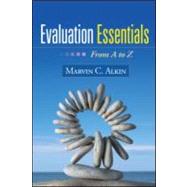Written in a refreshing conversational style, this text thoroughly prepares students, program administrators, and new evaluators to conduct evaluations or to use them in their work. The book's question-driven focus and clear discussions about the importance of fostering evaluation use by building collaborative relationships with stakeholders set it apart from other available texts. In 26 concise sections, Marvin C. Alkin explores how to articulate answerable evaluation questions, collect and analyze data using both quantitative and qualitative methods, and deal with contingencies that might alter the traditional sequence of an evaluation. Student-friendly features include handy bulleted recaps of each section, "Thinking Ahead" and "Next Steps" pointers, cautionary notes, annotated suggestions for further reading, and an in-depth case study that provides the basis for end-of-chapter exercises.








